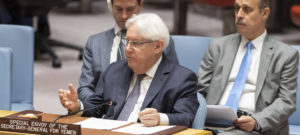 The United Nations Special Envoy for Yemen announced on Thursday that after two years of stalled talks on resolving the crisis in the country, he plans to invite the warring parties to Geneva on September 6 for a round of peace consultations.
The United Nations Special Envoy for Yemen announced on Thursday that after two years of stalled talks on resolving the crisis in the country, he plans to invite the warring parties to Geneva on September 6 for a round of peace consultations.
“It is time long past for us, together, to call for an early resumption of the political process, two years since the last round in Kuwait,” said Martin Griffiths, referring to the UN-supported peace talks that where first held three years ago in Switzerland before shifting to Kuwait in April 2016.
Since the uprisings that broke out in Yemen in early 2011, the UN has been engaged in helping Yemenis to find a peaceful solution. However, in March 2015, a coalition of countries led by Saudi Arabia intervened militarily at the request of President Abd Rabbou Mansour Hadi to secure the return of the Government to Sana’a, which had been seized by Houthi militias and allied units of the armed forces.
Three years on, the fighting is still raging, and the ensuing humanitarian crisis has only deepened in a country that was already one of the region’s poorest.
In his briefing to the Security Council Thursday, Griffiths said that it is time to “begin the difficult and uncertain journey away from war” and that there is now a chance “to weigh the opportunities for peace” in the war-ravaged country.
Describing the ongoing the battle for Hudaydah, a port city on the Red Sea, as “the centre of gravity of the war”, he stressed that the gap between the two sides is being narrowed “in a way that nobody expected”. This issue, he said, “has a better chance of being resolved within the context of a comprehensive political settlement”.
He called on Council members to “urge the parties to resolve this conflict through negotiation rather than through military means”, explaining that he will invite the warring parties to Geneva on September 6 for a round of talks.
“These consultations will provide the opportunity for the parties, among other things, to discuss the framework for negotiations, relevant confidence-building measures and specific plans for moving the process forward,” said Griffiths, requesting the Council’s support.
The Director of Operations for the UN Office for the Coordination of Humanitarian Affairs (OCHA), John Ging, also briefed the Council, painting a bleak picture of the situation on the ground, saying “the humanitarian situation is indeed shocking, both in scale and severity”.
